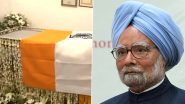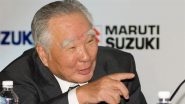New Delhi, Dec 26 (PTI) Manmohan Singh, the architect of India's economic reforms, had to literally face a trial-by-fire to ensure widespread acceptance of his path-breaking Union Budget of 1991 that saw the nation rise from its darkest financial crises.
Singh, the newly-appointed finance minister in the P V Narasimha Rao-led government, did it with great elan -- from facing journalists at a post-budget press conference and irate Congress leaders at the parliamentary party meeting who were unable to digest the wide-ranging reforms.
Singh's historic reforms in 1991 not only rescued India from near bankruptcy but also redefined its trajectory as a rising global power.
Singh made an unscheduled appearance at the press conference on July 25, 1991, a day after the presentation of the Union Budget "to ensure that the message of his budget did not get distorted by less-than-enthusiastic officials", Congress leader Jairam Ramesh writes in his book 'To the Brink and Back: India's 1991 Story' that recounts the fast-paced changes that took place after Rao became the prime minister in June 1991.
"The finance minister explained his budget -- calling it 'a budget with a human face'. He painstakingly defended the proposals to increase fertiliser, petrol and LPG prices," Ramesh recounts in the book published in 2015. Ramesh was an aide to Prime Minister Rao during his initial months in office.
Sensing the disquiet among the Congress ranks, Prime Minister Rao called a meeting of the Congress Parliamentary Party (CPP) on August 1, 1991 and decided to allow party MPs to "vent their spleen freely".
"The prime minister stayed away and allowed Manmohan Singh to face the flak on his own," Ramesh writes, adding that two more meetings took place on August 2 and 3, in which Rao was present throughout.
"In the CPP meetings, the finance minister cut a lonely figure and the prime minister did nothing to alleviate his distress," Ramesh recounts.
Only two MPs -- Mani Shankar Aiyar and Nathuram Mirdha -- backed Manmohan Singh's budget wholeheartedly.
Aiyar had supported the budget, contending that it conformed to Rajiv Gandhi's beliefs on what needed to be done to stave off the financial crisis.
Bowing to pressure from the party, Singh had agreed to lower the 40 per cent increase in fertilser prices to 30 per cent, but had left the hike in LPG and petrol prices untouched.
The Cabinet Committee on Political Affairs met twice on August 4 and 5, 1991 to decide on the statement Singh would make in the Lok Sabha on August 6.
"The statement dropped the idea of a roll-back which had been demanded over the past few days, but now spoke of protecting the interests of small and marginal farmers," the book states.
"Both sides had won. The party had forced a rethink, but the fundamentals of what the government wanted -- the decontrol of prices of fertilisers other than urea and an increase in urea prices -- had been preserved," Ramesh recounts.
"This was political economy at its constructive best -- a textbook example of how the government and the party can collaborate to create a win-win situation for both," the book states.
(This is an unedited and auto-generated story from Syndicated News feed, LatestLY Staff may not have modified or edited the content body)













 Quickly
Quickly
















